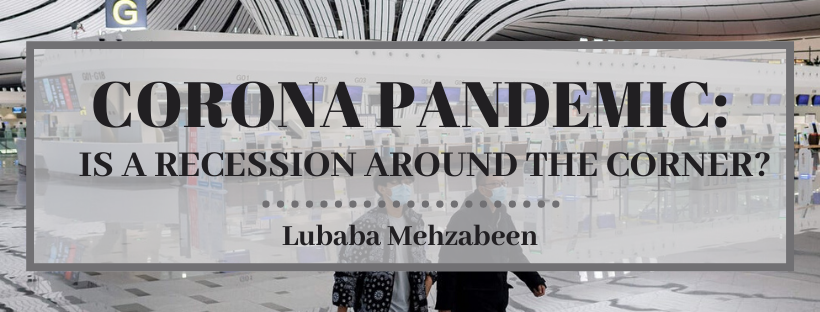ECONOMICS STUDY CENTER, UNIVERSITY OF DHAKA
|
Lubaba Mehzabeen "We are officially declaring that the economy has fallen into a recession ... joining the rest of the world, and it is a deep plunge," Bank of America said on 12th March." Jobs will be lost, wealth will be destroyed and confidence depressed." On that day, Wall Street has experienced a bear market and had its largest single-day percentage drop since Black Monday in 1987. Are all of these the result of the pandemic COVID-19? If that is true, then where is the global economy heading? COVID-19 COVID-19 is a highly contagious deadly disease that was first identified in Wuhan, China in 2019. But this disease slowly spread around the world and has been announced as a pandemic. It has infected more than 250,000 people and has killed at least 10,000 worldwide. No vaccine has yet been invented for this disease and the new drug, said to be able to cure this disease, is not widely available. Hence, health experts around the globe suggest social distancing which would decrease the number of cases so that the existing health infrastructure can cater to the diseased. But social distancing, which is certainly the best measure against coronavirus, has severe impacts on the economy. THE IMPACTS ON ECONOMY: Social distancing and quarantine mean that workers are supposed to stay at home instead of going to the factories. This, in turn, implies that factories can't produce and thus this disease has severe effects on manufacturing. Approximately, one-third of products of the world are made in China. Thus, when China has been hit hard by the coronavirus, businesses across the globe started facing the ripple effect. On the other hand, buyers cannot go out as well due to the lockdown. This means decreased consumption which decreases the revenues of all kinds of businesses. The global tourism industry and airplanes suffer severe losses in particular. Major US Airlines reported a 30% to 65% loss of revenues due to the travel bans imposed. Though some experts suggest that increased spending in healthcare and online shopping is something to be optimistic about, others consider them to be negligible compared to the huge losses. Given that workers' losing their jobs means a decrease in their purchasing power and even online shopping is threatened by the virus as transportation is restricted, these expectations are not compatible with reality. Thus, the overall effect on the economy is disastrous. In addition to this, the price war between Saudi Arabia and Russia, triggered by a dialogue between OPEC countries and Russia, eventually lead to a major fall in the prices of oil. Oil prices had already fallen by 30% as a result of a fall in demand and this further triggered it. Eventually, all this lead to a major crash in the global stock market. This proves that investors are afraid to invest, hence showing clear signs of a coming recession. Oxford Economics said earlier it expected China’s GDP growth to fall from 6% last year to 5.4% in 2020 due to coronavirus. It predicted that world GDP would drop $1.1tn, or 1.3% compared to the current projection if this becomes a pandemic. That is equivalent to losing the entire annual output of Indonesia, the world’s 16th largest economy. This prediction is a reality now. The Bank of America expects the US economy to shrink by 12% in the second quarter and GDP for the full year to contract by 0.8%. Moreover, more than 1 million jobs could be lost leading the unemployment rate to peak at 6.4%. The Guardian reports a survey of 1,000 SMEs conducted by two Chinese universities which found that unless conditions improved, one-third of the firms would run out of cash within a month. Another survey of 700 companies found that 40% of private firms would run out of cash within three months. In conclusion, the coronavirus has a sweeping effect on all sectors of the economy. All these mean high rates of unemployment, bankruptcies and economic distress across the globe. THE CONDITION OF BANGLADESH: Bangladesh is extremely vulnerable because its biggest trade partner is China and hence a supply shock is already visible. An outbreak of coronavirus will also cause demand shock. Moreover, as spending on goods will decrease across the globe, our export-oriented industries will suffer a lot. Experts warn that industries like the RMG which form significant portions of our GDP will be harmed severely. The lockdown has already taken a toll on jobs and productivity. THE FUTURE? According to some experts, traditional measures of reviving the economy, like increasing government spending or reducing interest rates will not be effective this time given this disease prevents workers from participating in production and consumers from going out to consume. However, to prevent any further decrease in spending, experts suggest that companies should be given incentives to hoard labour, such as, by announcing tax credit. Moreover, ways to consume from home, like online shopping should be encouraged. Both the USA and the UK have introduced lower interest rates to deal with the economic disaster. Experts across the globe suggest monetary stimulus. They also suggest bailouts, especially in airlines and hospitality industries. Besides all these, policymakers are demanding universal basic income to make sure that people can maintain a minimum standard of living as well as consume enough to keep the economy running. Though for countries like ours, all of these steps are not feasible, immediate government intervention is needed. While the world faces a pandemic, big economic challenges await.
2 Comments
Leave a Reply. |
Send your articles to: |



